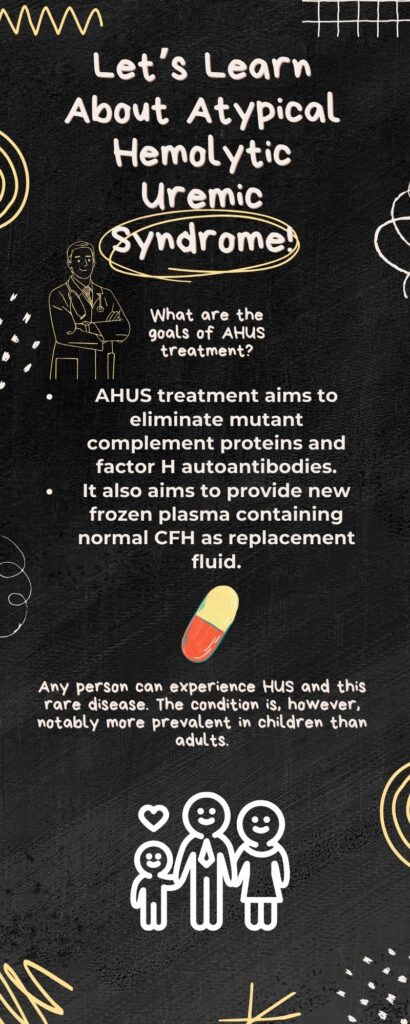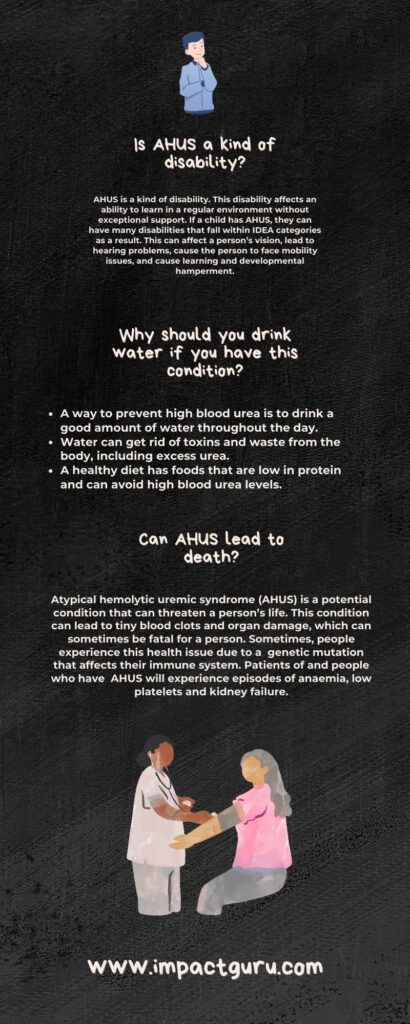Patients have all kinds of needs. People with different types of health issues and conditions must try to understand what they are experiencing and put their best foot forward to play an active role in their treatment. Playing an active role in your treatment is very important; This can make a significant difference. When you get your treatment, you can uneaten your doctor’s approach, the nature of the health issues or problems you are facing or experiencing, and how your health is improving. You will be able to under any complications you are facing or experiencing at the time and more. This can be very important for you and make a difference. A person may expect a heat issue called or known as atypical hemolytic uremic syndrome; about this health issue or problem, it can be helpful for people to know about things such as atypical hemolytic uremic syndrome treatment, atypical hemolytic uremic syndrome (AHUS), atypical hemolytic uremic syndrome life expectancy, atypical hemolytic uremic syndrome diagnosis, atypical hemolytic uremic syndrome cause, what is atypical hemolytic uremic syndrome and more.
Table of Contents
- What Is Atypical Hemolytic Uremic Syndrome (AHUS)?
- How Is Atypical Hemolytic Uremic Syndrome Treatment Done?
- What Is The Usual Atypical Hemolytic Uremic Syndrome Life Expectancy?
- How Will I Get My Atypical Hemolytic Uremic Syndrome Diagnosis?
- What Is The Atypical Hemolytic Uremic Syndrome Cause?
- What Questions Can I Ask About This Health Condition?
- Conclusion
What Is Atypical Hemolytic Uremic Syndrome (AHUS)?

One may want to know what atypical hemolytic uremic syndrome is. AHUS, which is also known as or called atypical hemolytic uremic syndrome, is a sporadic genetic disease that can affect a person. This health condition or genetic disorder that a person can experience can cause tiny blood clots to form in the blood vessels of a person. Small blood clots can block the blood flow to essential organs in the person’s body. This can lead to some problems AHUS can cause and lead to issues such as kidney failure, heart disease, and other serious health problems, which can sometimes even be fatal to the person, primarily if the health issue or the health problem has not been addressed in the appropriate manner or way. While there is no known cure for AHUS, this can be managed in some way, and the symptoms of the health issue or health condition can be reduced. This can allow a person to feel much more at ease and exercise and face fewer issues as a result of this health issue at they are facing or are experiencing. You can ask your doctor or an appropriate medical professional to know more about this.
How Is Atypical Hemolytic Uremic Syndrome Treatment Done?
Understanding the treatment for the health issue or health problem you or a loved one are facing or experiencing is very important. This can help you and allow you to feel much more confident during the treatment. This can also clear any doubts that you may have had about this. The further you know and understand your treatment, the better it will be for you. When it comes to atypical hemolytic uremic syndrome treatment, it is also a good idea to know and to try to understand what one must or can expect about this. How your doctor or medical professional treats and addresses your health regarding AHUS will usually depend on a range of factors. Understanding these factors can allow you to understand better the treatment or conditions you will go to a tribe and how your health will be addressed. One of the primary factors influencing the atypical hemolytic uremic syndrome treatment is the underlying cause and severity. If the person is experiencing a milder form of AHUS, the doctor or medical professional will often choose to monitor the patient’s health and provide supportive care in case they need it or require it. Some supportive care may be given and afforded to the patient, such as blood transfusions or high blood pressure medications. These Can help the patient and improve their chalky condition. If a person is facing or experiencing severe AHUS, they may require or need more rigorous treatment.
In case the patient has severe AHUS, the following atypical hemolytic uremic syndrome treatment could help them:
Therapeutic plasma exchange.
Rituximab or other drugs can be employed in treating autoimmune diseases.
Dialysis can be done for the patient.
Kidney transplants can be done for the person or the patient in severe cases or situations.
For people experiencing complement mutations, doctors or medical professionals may commonly use medications such as eculizumab in atypical hemolytic uremic syndrome treatment. This can be useful in blocking specific complement proteins and preventing the immune system from damaging your blood vessels.
The complications or side effects you have experienced due to some health issue or health problem are valuable and essential to understand. There may be some complications and side effects that you can experience due to or as a result of atypical hemolytic uremic syndrome treatment. Complications/side effects of atypical hemolytic uremic syndrome treatment that you must keep in mind are that eculizumab can sometimes reduce the amount of protection a person has when it comes to meningococcal and pneumococcal vaccinations. If that can happen, your doctor or medical professional might also encourage you to get these vaccinations before you begin eculizumab for your atypical hemolytic uremic syndrome treatment.
What Is The Usual Atypical Hemolytic Uremic Syndrome Life Expectancy?
The life expectancy of atypical hemolytic uremic syndrome is valuable and essential to know about and understand. Whenever a patient has any health issue or condition, they may wish to extend their life expectancy and how much they may suffer because of the condition or health issue. This can be useful for helping the person understand the nature of the health problem they are experiencing. This can also let the person know how long they will receive treatment. Suppose a person understands how long they will be going through b or receiving treatment for their health issue or condition. In that case, this can also help them plan the finances they may incur throughout their treatments and consultations. The first stage of HIS will usually last about 1 to 15 days for a person. When the person has this condition, they can experience some gastrointestinal symptoms, such as pain in the abdomen region, diarrhea that is blood,y, and more. Roughly 50% of AHUS patients or people who have this condition develop ESRD. Most people will have an overall mortality rate of 25%. This means that 1 out of 4 people who have this condition will pass away as a result of it.
You should know more about the life expectancy of AHUS. You can learn more about the life expectancy of AHUS from your doctor or medical professional by approaching or consulting them. You can also learn more about AHUS life expectancy using online sources and search engines. There may also be valuable offline resources, such as medical magazines, books, and medical brochures, which could offer essential information about AHUS life expectancy.
How Will I Get My Atypical Hemolytic Uremic Syndrome Diagnosis?
Diagnosing a health issue or health condition is very important, and understanding how you will be diagnosed with some health condition or health issue can also be helpful. One may also wish to know about the diagnosis of AHUS and how they will be organized with the same. When it comes to the AHUS diagnosis, the doctor or the medical profession will usually diagnose a person with AHUS based on the kinds of symptoms that they are exercising or having. The person or patient can also receive their AHUS diagnosis based on the results of some types of tests. These tests can check the blood cell counts and how well a person’s organs function. A doctor or medical professional can also perform tests that rule out other conditions a person could be experiencing that can cause similar symptoms, such as STEC-HUS.
A person may go through the following tests and procedures for their diagnosis:
- Some blood tests may be done or carried out on the person, which can also involve a complete blood count (CBC) and tests helpful in checking the kidney function in a person’s body.
- Some genetic testing may be done on the person, which can see if they are suffering from or experiencing any genetic issues as a part of the diagnosis.
Tests of the stools or the poop of a person. - A kidney biopsy may be done or carried out as part of the diagnosis.
- Some kinds of imaging, such as ultrasound or CT scans. It can also often be done or carried out on the person or the patient.
What Is The Atypical Hemolytic Uremic Syndrome Cause?
Patients may wish to know and understand the cause of AHUS. The cause of any health condition or health issue is critical to understand. The cause of the AHUS is also helpful to understand and can help a patient during their medical journey. Most cases of AHUS that a person can experience are caused due to genetic reasons. It is important to remember that a person could experience this health issue as a result of autoantibodies or occur for unknown reasons (idiopathic) as well. AHUS may become chronic for the person as well. This will mean that the affected individuals can experience repeated episodes of the disorder as an express kit for an extended period or their whole life.
You can ask your doctor more about the cause of AHUS. There may be some online sources about atypical hemolytic uthat you can also find. There can also be some offline resources that can lend you helpful information about the cause of thus health issue such as medical brochures, books, and medical magazines as well.
What Questions Can I Ask About This Health Condition?
Your doctor or medical professional can provide you with more than just the treatment for your health condition or health issue. Your doctor or medical professional can also offer and guide you with information and explanations related to your health issue or condition. They may also be able to do so if you ask them suitable questions about your health, treatments, conditions, and more that can impact your health and medical state. It helps a person have suggestions on what they can ask or inquire from their doctor or medical professional.
Some questions that you can ask your medical professional are the following –
- What does the prognosis of my health look like for this health issue?
- How long would it take to feel normal after my accidental emergency treatment?
- Are there any home remedies for the issues that I am facing?
- What medications will I be given?
- What kinds of procedures will I have to go through?
- Am I facing severe health issues, or are the problems not so serious?
- What kinds of measures can people around me take to help me with my medical issue?
- What medical facility or hospital best treats this health issue?
- Who can I get a second opinion about my health if I need the same about this health problem?
- Will I need to be admitted to the hospital if my state of health does not improve?
- What should I do if I experience some medical problems when I am not at the hospital or medical faculty where I am currently receiving or undergoing my treatment at the time?
- What should I do if I am facing or experiencing this sheath problem but am far from a hospital or medical facility now?
Remember that the above questions are not evocative and may only cover things you can ask your doctor and medical professional. If you are experiencing anything unusual, you should ask your doctor or medical professional about the situation. You must address any issues as soon as you experience them or as soon as they arise. This can avoid any unwanted problems or complications you could experience.
Conclusion
To conclude, it is essential to remember and understand how a health condition can affect you and other important information related to it. When you know what you are exercising regarding your health and treatments, you can enjoy a smoother medical journey. You will feel more confident about your health and medicine and the approach of your doctor or medical professional when she is critical to you. This is why it is crucial to know about things that are related to atypical hemolytic uremic syndrome, such as atypical hemolytic uremic syndrome treatment, atypical hemolytic uremic syndrome (ahus), atypical hemolytic uremic syndrome life expectancy, atypical hemolytic uremic syndrome diagnosis, atypical hemolytic uremic syndrome cause, what is atypical hemolytic uremic syndrome and more. This will help ensure you have the smoothest, come as close to an ideal medical journey as possible, and get the best results from your treatment and consultations. Crowdfunding can ease the financial burden of rare disease treatments.














